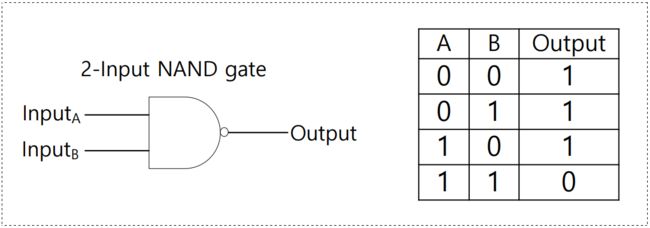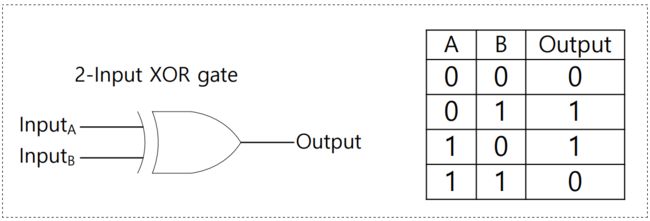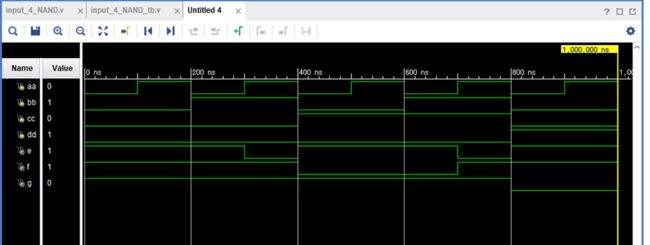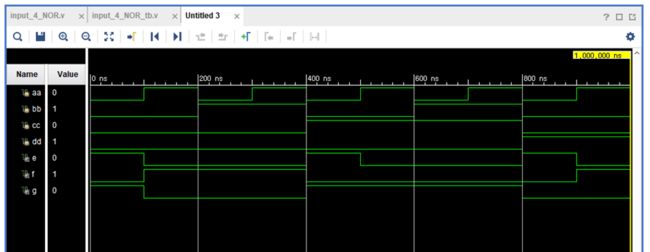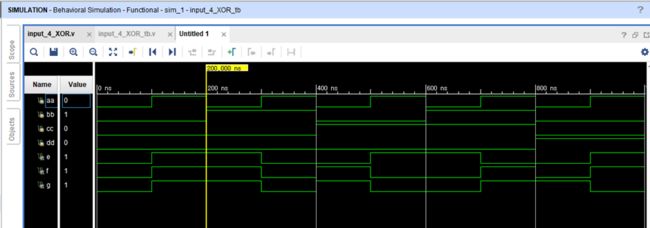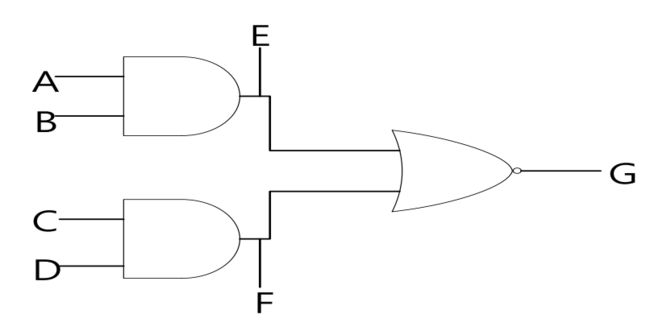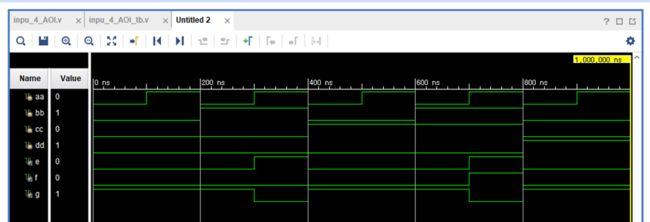【FPGA】Verilog 编码实现:与非门 | 或非门 | 异或门 | NAND/NOR/XOR 行为验证
写在前面:本章主要内容为了解和确认 NAND/NOR/XOR 门的行为,并使用Verilog实现,生成输入信号后通过模拟,验证每个门的操作,并使用 FPGA 来验证 Verilog 实现的电路的行为。
本章目录:
Ⅰ. 前置知识
0x00 与非门(NAND)
0x01 或非门(NOR)
0x02 异或门(XOR)
Ⅱ. 练习(Assignment)
0x00 4-input NAND gate
0x01 4-input NOR gate
0x02 4-input XOR gate
0x03 4-input AOI(AND OR Inverter) gate
Ⅰ. 前置知识
0x00 与非门(NAND)
如果所有输入均为High (1),则输出为Low (0),在其他情况下,将产生High (1) 输出。
- NAND 是 AND 运算符的否定结果
布尔表达式中以 "负乘法" 形式表现:
0x01 或非门(NOR)
如果所有输入均为 Low (0),则输出为 High(1),其中一个输入为高 (1) 则产生低功率 (0)。
- NOR 是 OR 运算符的否定结果
布尔表达式中以 "否定合" 形式表现:
![]()
0x02 异或门(XOR)
如果 两个值不相同,则异或结果为1。如果 两个值相同,异或结果为0。
Ⅱ. 练习(Assignment)
0x00 4-input NAND gate
比较 AB 的布尔表达式,完成 A 和 B 的 Verilog 代码,通过 Simulation 结果进行比较。
Design source:
`timescale 1ns / 1ps
module input_4_NAND(
// Input the var
input a, b, c, d,
// Output the var
output e, f, g
);
// NAND = NOT + AND
assign e = ~(a & b); // a and b then inv
assign f = ~(e & c); // e and c then inv
assign g = ~(f & d); // f and d then inv
endmoduleSimulation:
`timescale 1ns / 1ps
module input_4_NAND_tb;
reg aa, bb, cc, dd;
wire e, f, g;
input_4_NAND u_input_4_NAND (
.a(aa),
.b(bb),
.c(cc),
.d(dd),
.e(e),
.f(f),
.g(g)
);
initial aa = 1'b0;
initial bb = 1'b0;
initial cc = 1'b0;
initial dd = 1'b0;
always aa = #100 ~aa;
always bb = #200 ~bb;
always cc = #400 ~cc;
always dd = #800 ~dd;
initial begin
#1600
$finish;
end
endmodule运行结果如下:
解读:在 assign 语句中,用取反运算符 ~ 和或运算符 | 实现了 4 个输入取反或运算,并将结果分别赋值给输出变量 e, f, g。
0x01 4-input NOR gate
比较 AB 的布尔表达式,完成 A 和 B 的 Verilog 代码,通过 Simulation 结果进行比较。
Design source:
`timescale 1ns / 1ps
module input_4_NOR(
/* Input the var */
input a, b, c, d,
/* Output the var */
output e, f, g
);
/* NOR = NOT + OR */
assign e = ~(a | b);
assign f = ~(e | c);
assign g = ~(f | d);
endmoduleTestbench:
`timescale 1ns / 1ps
// input_4_NOR_tb
module input_4_NOR_tb;
// input
reg aa, bb, cc, dd;
// output
wire e, f, g;
input_4_NOR u_input_4_NOR (
.a(aa),
.b(bb),
.c(cc),
.d(dd),
.e(e),
.f(f),
.g(g)
);
initial aa = 1'b0;
initial bb = 1'b0;
initial cc = 1'b0;
initial dd = 1'b0;
always aa = #100 ~aa;
always bb = #200 ~bb;
always cc = #400 ~cc;
always dd = #800 ~dd;
initial begin
#1600
$finish;
end
endmodule
运行结果如下:
0x02 4-input XOR gate
比较 AB 的布尔表达式,完成 A 和 B 的 Verilog 代码,通过 Simulation 结果进行比较。
Design source:
`timescale 1ns / 1ps
module input_4_XOR(
/* Input the var */
input a, b, c, d,
/* Output the var */
output e, f, g
);
/* XOR */
assign e = a ^ b;
assign f = e ^ c;
assign g = f ^ d;
endmoduleTestbench:
`timescale 1ns / 1ps
module input_4_XOR_tb;
// input
reg aa, bb, cc, dd;
// output
wire e, f, g;
input_4_XOR u_input_4_XOR (
.a(aa),
.b(bb),
.c(cc),
.d(dd),
.e(e),
.f(f),
.g(g)
);
initial aa = 1'b0;
initial bb = 1'b0;
initial cc = 1'b0;
initial dd = 1'b0;
always aa = #100 ~aa;
always bb = #200 ~bb;
always cc = #400 ~cc;
always dd = #800 ~dd;
initial begin
#1600
$finish;
end
endmodule运行结果如下:
0x03 4-input AOI(AND OR Inverter) gate
Design source:
`timescale 1ns / 1ps
module inpu_4_AOI (
/* Input the var */
input a, b, c, d,
/* Output the var */
output e, f, g
);
/* AOI */
assign e = a & b;
assign f = e & c;
assign g = ~(e | f);
endmoduleTestbench:
`timescale 1ns / 1ps
module inpu_4_AOI_tb;
// input
reg aa, bb, cc, dd;
// output
wire e, f, g;
inpu_4_AOI u_inpu_4_AOI (
.a(aa),
.b(bb),
.c(cc),
.d(dd),
.e(e),
.f(f),
.g(g)
);
initial aa = 1'b0;
initial bb = 1'b0;
initial cc = 1'b0;
initial dd = 1'b0;
always aa = #100 ~aa;
always bb = #200 ~bb;
always cc = #400 ~cc;
always dd = #800 ~dd;
initial begin
#1600
$finish;
end
endmodule运行结果如下:
![]()
[ 笔者 ] 王亦优
[ 更新 ] 2022.9.20
❌ [ 勘误 ] /* 暂无 */
[ 声明 ] 由于作者水平有限,本文有错误和不准确之处在所难免,
本人也很想知道这些错误,恳望读者批评指正!| 参考资料 Introduction to Logic and Computer Design, Alan Marcovitz, McGrawHill, 2008 Microsoft. MSDN(Microsoft Developer Network)[EB/OL]. []. . 百度百科[EB/OL]. []. https://baike.baidu.com/. |

